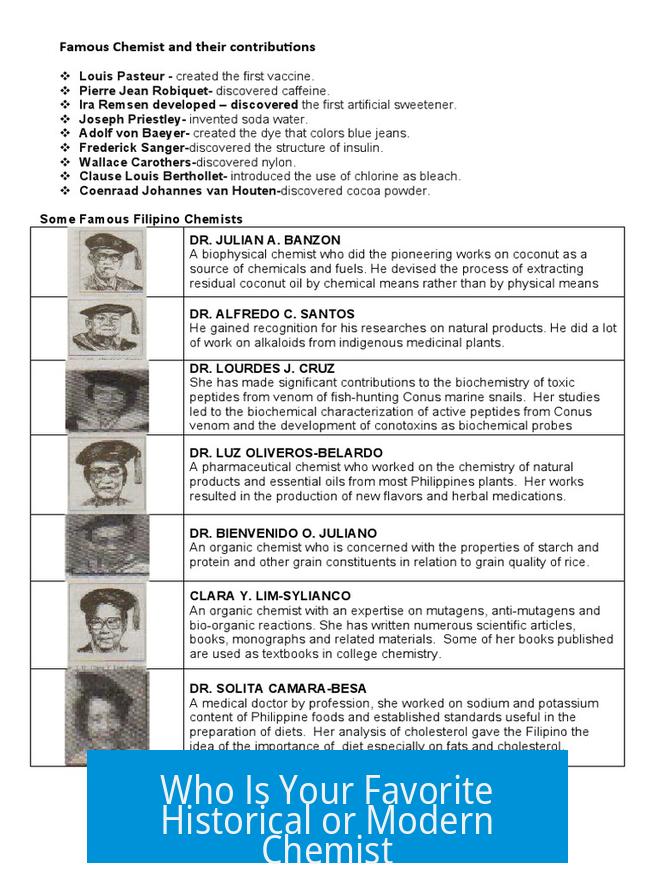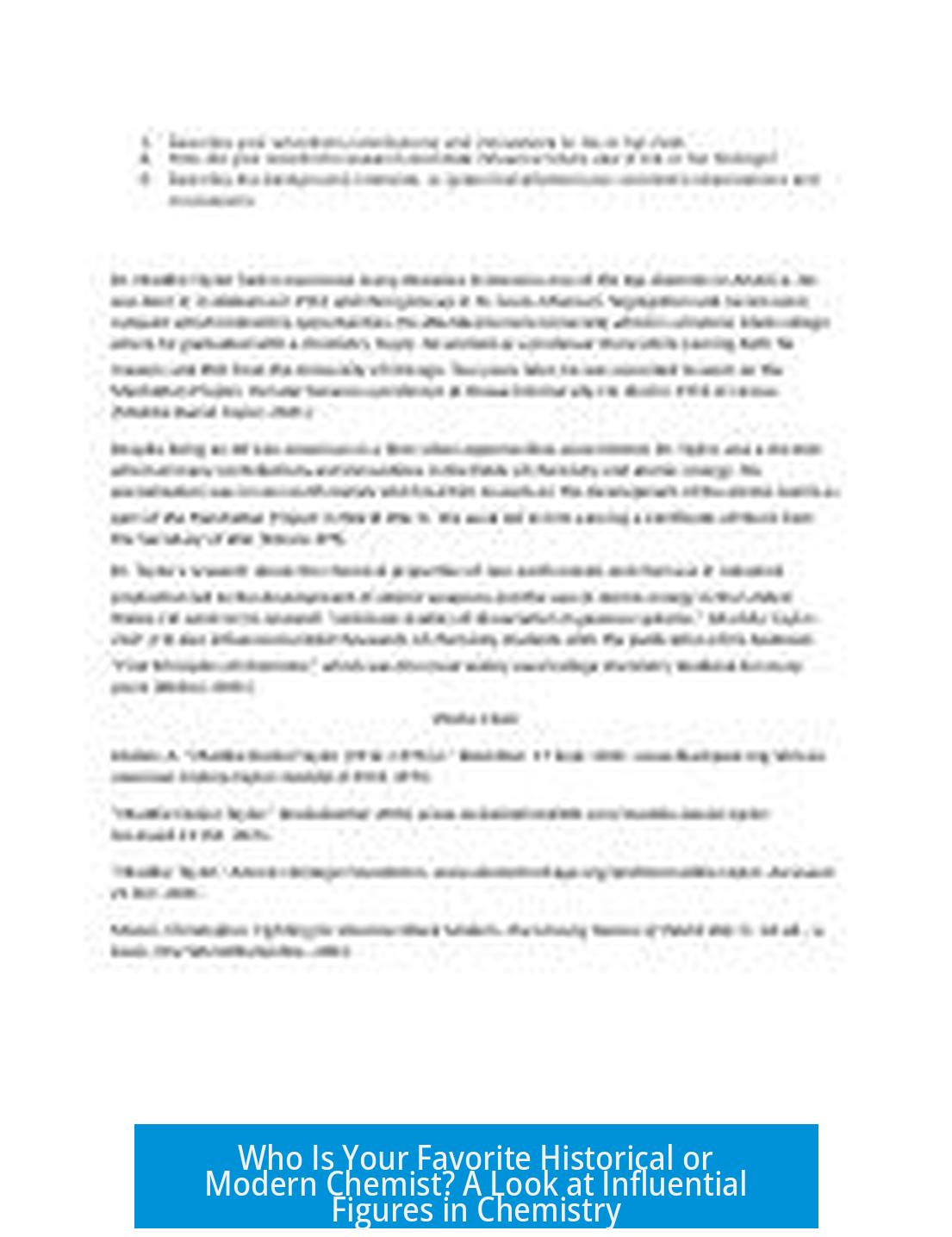Who Is Your Favorite Historical or Modern Chemist?

The choice of a favorite chemist varies widely depending on individual interests and the impact these figures had on the science and society. Some favor transformative pioneers like Antoine Lavoisier for founding modern chemistry, while others admire 20th-century innovators such as Linus Pauling or contemporary scientists pushing the boundaries of bioorthogonal chemistry like Carolyn Bertozzi.
Prominent Historical Chemists and Their Impact
Antoine Lavoisier: The Father of Modern Chemistry
Antoine Lavoisier stands out as a foundational figure. He revolutionized chemistry, discovering and naming oxygen and establishing the law of conservation of mass. His empirical approach marked chemistry’s transition from alchemy to a rigorous science. Often compared to Darwin in biology and Newton in physics, Lavoisier set the stage for modern chemical research and education.
John Dalton: The Atomic Pioneer
John Dalton developed the atomic theory, positing that elements consist of indivisible atoms. Despite limited formal education, his work on gas laws and atomic weights significantly shaped chemistry’s conceptual framework. Dalton’s contributions underpin much of modern chemistry and physical science.
Michael Faraday: The Versatile Experimenter
Michael Faraday’s extensive discoveries include electromagnetic induction and electrochemistry fundamentals. His work bridges physics and chemistry, influencing energy science. Faraday’s commitment to experimental demonstration and public lectures made him a beloved figure among chemists and lay audiences alike.
Friedrich Wöhler and the Birth of Organic Chemistry
Wöhler’s synthesis of urea from ammonium cyanate disproved the vitalism theory, which held that organic compounds could only come from living organisms. This discovery marked the dawn of organic synthesis and expanded understanding of chemical processes beyond biological systems.
Humphrey Davy and Electrochemistry
Famous for isolating elements like sodium and potassium through electrolysis, Davy also debunked the caloric theory in his youth. His public demonstrations popularized chemistry, sometimes to the point of causing London traffic jams, reflecting society’s fascination with scientific progress.
Other Historical Figures
- Carl Wilhelm Scheele: Prolific element discoverer, including oxygen and chlorine.
- Joseph Priestley: Early discoverer of oxygen and advocate of pneumatic chemistry.
- Justus von Liebig: Innovated chemical education and mentored many influential chemists.
- Svante Arrhenius: Advanced theories on electrolytes and chemical kinetics.
Influential 20th Century Chemists and Their Legacy
Linus Pauling: Chemical Bonding and Molecular Biology
Linus Pauling’s work on the nature of the chemical bond reshaped chemistry and earned him a Nobel Prize. Beyond chemistry, his research influenced molecular biology and medicine. Though some of his later views, such as on vitamin C, attracted controversy, his scientific contributions remain foundational.
Robert Burns Woodward: Synthesis Mastermind
Woodward excelled in the total synthesis of complex organic molecules. Despite a difficult personality, his intuitive understanding of chemical structures accelerated organic chemistry’s growth. Colleagues honor him with playful references, such as the “milli-Woodward timescale,” highlighting his lasting influence.
Gilbert Newton Lewis: The Unsung Hero
Lewis pioneered concepts in bonding, acids and bases, and electron pairs. Despite multiple Nobel nominations, he never won. His name appears throughout chemical literature, though public recognition lags behind peers like Pauling or Faraday.
Wallace Carothers: Polymer Innovator
Carothers’s invention of neoprene and nylon transformed materials science. His work helped move industry beyond natural polymers, vital during World War II’s supply constraints. His tragic death overshadows his lasting industrial impact.
Percy Julian: Steroid Chemistry Trailblazer
Julian’s synthesis of steroid hormones paved the way for birth control and corticosteroids. His achievements are notable amid social barriers, reflecting innovation intertwined with perseverance.
Other Noteworthy 20th Century Chemists
- Alexander Shulgin: Celebrated for experimental rigor and unconventional chemical exploration.
- Fritz Haber: Known for ammonia synthesis but controversial due to chemical warfare involvement.
- Jean-Marie Lehn: Originator of supramolecular chemistry.
- Carolyn Bertozzi: Pioneer in bioorthogonal chemistry and Nobel laureate.
- Mary Elliott Hill: Early African American female scientist with crucial contributions in analytical chemistry.
Personal Mentors and Contemporary Chemists
Many chemists prefer to recognize their mentors or professors as favorite figures. Undergraduate advisors who inspire confidence and foster curiosity leave lasting impressions and shape future research paths. For example, Philip Eaton is admired for accessibility and encouragement. Such personal connections often define one’s favorite figure in chemistry more than historic fame.
Popular Culture and Fictional Choices
Out of popular culture, Walter White from the television series “Breaking Bad” is frequently named humorously as a favorite chemist. Though fictional, his character’s deep engagement with chemistry brought attention to the discipline outside academic circles, sparking wider interest.
Additional Notable Mentions
- Marie Curie: First to win Nobel Prizes in two scientific fields.
- Niels Bohr and Ernest Rutherford: Architects of atomic structure understanding.
- Frederick Sanger: Double Nobel laureate in chemistry for protein and DNA sequencing.
- Kary Mullis and Sarah Gilbert: Innovators in PCR technology and vaccine development respectively.
Summary of Key Takeaways
- Antoine Lavoisier is widely regarded as the father of modern chemistry due to his foundational discoveries.
- Figures like John Dalton, Michael Faraday, and Friedrich Wöhler advanced core chemical concepts and synthesis.
- 20th-century pioneers such as Linus Pauling and Robert Woodward pushed chemical understanding and synthesis techniques forward.
- Personal mentors and contemporary researchers shape modern appreciation of chemistry’s creativity and rigor.
- Popular media characters like Walter White highlight chemistry’s cultural presence despite fictionality.
- Recognition of diversity, including figures like Percy Julian and Mary Elliott Hill, broadens the historical narrative.





Leave a Comment